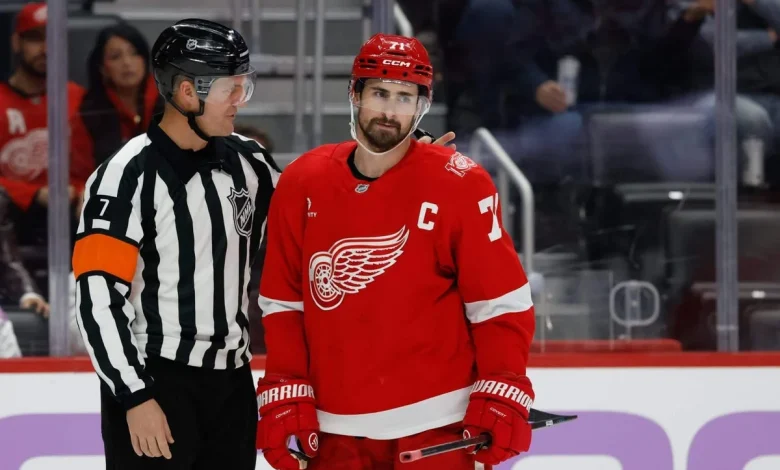Can Red Wings tame their wild swings to begin the season?

DETROIT — Coming off two of their most complete performances of the young season, the Detroit Red Wings took the ice Thursday night with a chance to get a win streak rolling. They left it with boos raining down after a 5-0 loss to the New York Islanders.
“We were slow,” Red Wings captain Dylan Larkin said. “We didn’t have it.”
Twenty-one games into this campaign, that’s become too familiar a sentiment for the Red Wings. They’ve already had at least a handful of nights like Thursday, when they simply didn’t give themselves much of a chance.
It’s a bizarre theme for a team that sits atop the Atlantic Division, but it’s Detroit’s reality right now.
We knew coming into the season that the Red Wings could score on the power play and on the rush. They’ve shown on plenty of nights that they have it in them to play harder, more disciplined hockey as well. It’s been one of the season’s most important developments.
On the nights they’ve been off, though? They’ve been way off — to the point you never know what to expect from them on a given night.
Some degree of game-to-game variance is unavoidable over an 82-game season, but the volatile swings from this group have been beyond that.
“Something that good teams even struggle with is being consistent,” forward J.T. Compher said. “There’s a reason teams don’t win 75 games or whatever: It’s a hard league. But the lower level has to be higher than that.”
The natural question: Why hasn’t it been?
“We’ve shown it in pieces, and we’ve shown it when we’ve played well,” Larkin said. “We’re going to be a team that has to check. And to check, you have to have your legs. And with this schedule, it’s going to be hard. But our B-game and our C-game have to be a lot better than that.”
It was an unusually quiet night for the Red Wings’ top line, which entered the game with Larkin, Lucas Raymond and Alex DeBrincat, Detroit’s top scorers. Recently, they have been the Red Wings’ most bankable players. By the end of the night, the trio had been broken up, with rookie Emmitt Finnie moved back up and DeBrincat dropped down to the second line, where he typically has been, opposite Patrick Kane. Detroit coach Todd McLellan has tried all kinds of combinations of late, and it looks like that experimentation will continue.
Larkin used the word “slow.” You could just as easily use “flat,” and that was evident up and down the lineup. There were also mental lapses that led to multiple goals against the Red Wings. That’s all part of the recipe for this team’s scrambled performance so far.
There was Ben Chiarot chasing a big hit at the blue line, only for it to lead to a two-on-one the other way, capped by the Islanders’ first goal. There were also two key mistakes on defensive-zone faceoffs that led to goals, which seemed to particularly bother McLellan.
“The interesting thing is, before the first faceoff goal … their center got kicked out, and their attack — or their faceoff play, if you want to call it (that) — changed,” McLellan said. “And we should have seen it right away. And we didn’t. And right away, you get worried because, ‘Are you not sharp enough?’ They’re moving their pieces around, and we’re not even looking at it or thinking about it. … Another faceoff, slow off the (drop), and sure enough, (it’s a goal). So, I can’t explain what we’re thinking. I understand we’re not going to be perfect, but back-to-back situations like that?”
The Red Wings have players who are trying to get going, with the most obvious being young forward Marco Kasper. One of the team’s best players down the stretch as a rookie last season, Kasper hasn’t looked the same thus far, lacking the constant buzz and nose for the net that previously made him so noticeable shift to shift. Thursday, he mishandled a puck in the defensive zone, eventually leading to a Mathew Barzal goal for New York.
Kasper is frustrated, and that boiled over into a fight with Tony DeAngelo in the final minutes. The 21-year-old cares, and he’s far from the first young player to experience a sophomore slump. For a team that has come to depend on him for disruption, pace and offense, however, his quiet start has had an impact.
“I know, he knows, his teammates know: He’s a better player than what we have right now,” McLellan said. “So, everybody’s got to participate in cracking that nut. Starting with Marco, and then (the) coaching staff and his teammates have to help him. But we need the best from him, and right now, he doesn’t look like the same player.”
The Islanders’ final goal came when Max Shabanov — who entered the night with one career goal — split the Red Wings’ top defensive pairing of Moritz Seider and Simon Edvinsson, then beat goaltender John Gibson for his second tally, a mystifying play in its own right.
When the Red Wings fail to score a goal and make those kinds of mistakes, there is plenty of blame to go around. In a big-picture sense, though, it’s also getting to the point where it’s natural to wonder about Gibson, too.
The Red Wings traded for the veteran netminder this offseason, looking to stabilize a position that has been a persistent issue for them for close to a decade. Though Detroit certainly hasn’t made it easy on the new netminder, Gibson has struggled in the early going. His .870 save percentage is tied for the sixth lowest in the league among goalies who have played at least five games.
“I think it’s been hard for Gibby because he’s come to a new team later in his career, and he’s had to adjust and adapt to coaching staff, styles, new goalie coach, teammates, the way we play,” McLellan said. “We haven’t given him our best game. We, all of us, that put the equipment on in front of him or wear the suits on the bench.”
That may well be, and with zero goals, the Red Wings would have lost Thursday’s game even if Gibson had been spectacular. Still, the first quarter of the season has not been encouraging for him, and Thursday wasn’t any better. Though the Red Wings traded for him to elevate the goalie position, he has frequently looked like more of the same.
There’s still plenty of time for that to change, of course. Just as there is for Kasper and for the too-frequent mental lapses affecting this team. They’re also still in first place despite it all.
Detroit has played enough games by now, however, to recognize that its wild swings are more than an occasional anomaly. They’re a pattern, and it goes beyond the usual ups and downs of a season.
“You can play really good in this league and not win,” Compher said. “We didn’t even give ourselves a chance to do that.”
That once again leaves the Red Wings trying to regroup, looking for answers and solutions. Their early track record suggests they will find them, whether it’s immediately or takes a couple of days. They’ve proved they can respond.
For a team in their position, the real key will be not needing response games nearly so often.





